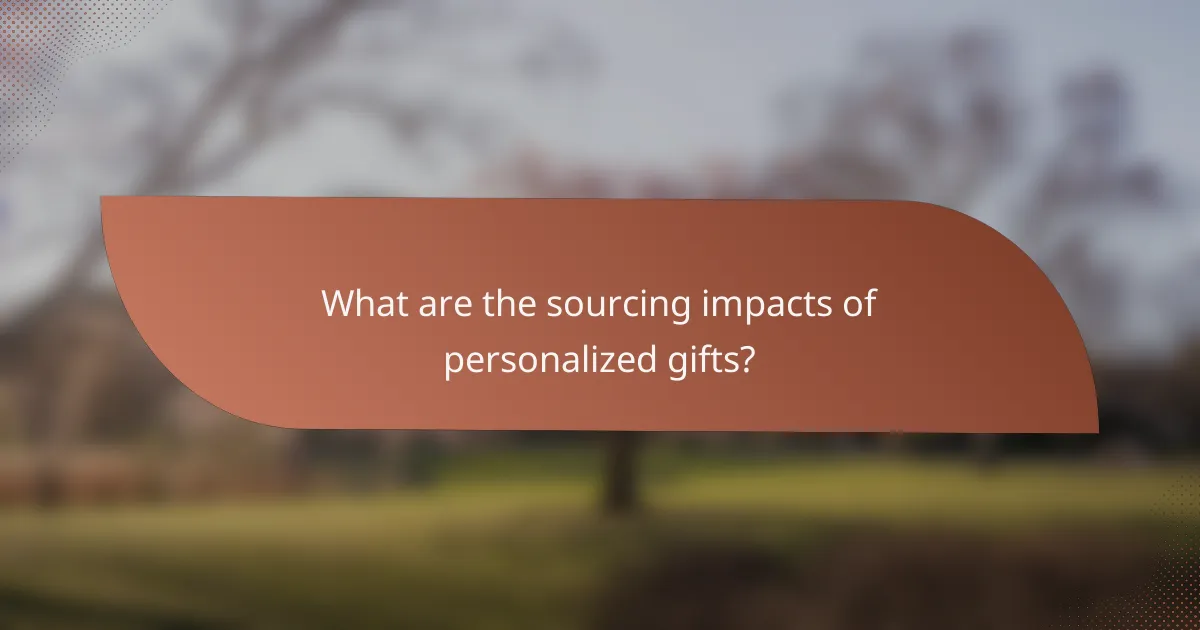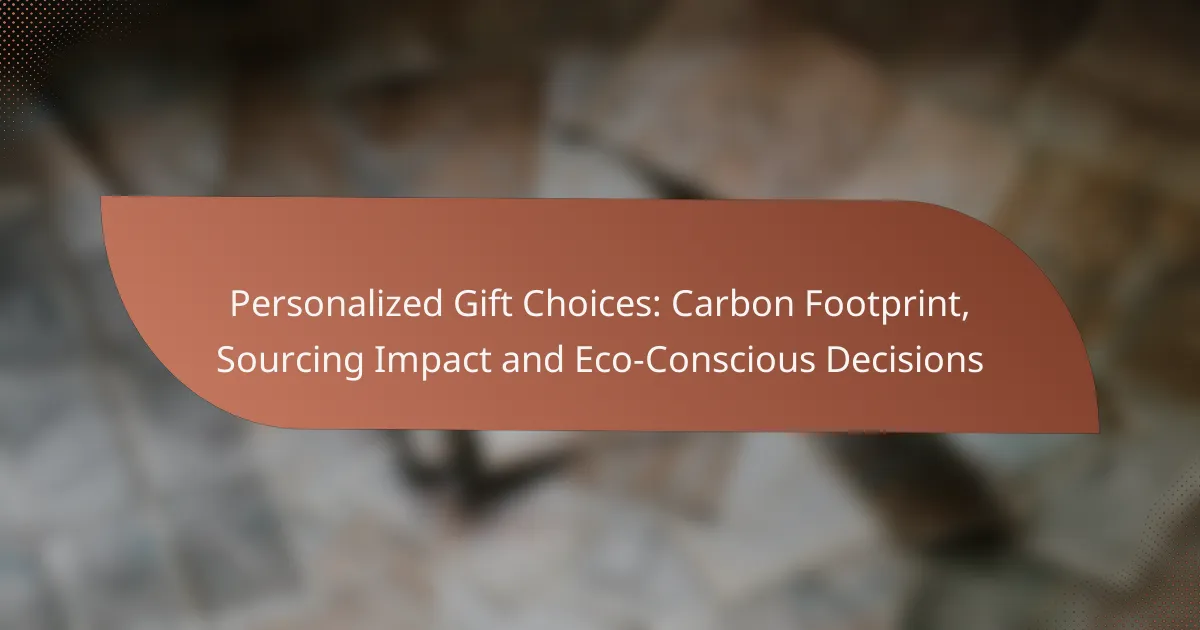In today’s eco-conscious world, personalized gifts are not just about uniqueness but also about minimizing environmental impact. By choosing items made from sustainable materials and supporting local artisans, consumers can make thoughtful decisions that reflect their values. Additionally, understanding the carbon footprint and sourcing impacts of these gifts empowers individuals to contribute positively to the planet while still giving meaningful presents.

What are eco-friendly personalized gift options?
Eco-friendly personalized gift options are items that minimize environmental impact while offering a unique, tailored touch. These gifts often utilize sustainable materials, support local artisans, or promote a zero-waste lifestyle.
Recycled material products
Gifts made from recycled materials help reduce waste and conserve resources. Common options include notebooks crafted from recycled paper, jewelry made from reclaimed metals, and home decor items fashioned from repurposed glass or plastic.
When selecting recycled products, look for certifications that verify the use of genuine recycled content. This ensures that your gift is not only unique but also contributes positively to the environment.
Locally sourced handmade gifts
Locally sourced handmade gifts support artisans in your community while reducing carbon emissions associated with transportation. Options can range from custom pottery to hand-knit scarves, all crafted with care.
Consider visiting local craft fairs or artisan markets to discover unique pieces. This not only provides a personal touch but also strengthens local economies and fosters sustainable practices.
Plantable gifts
Plantable gifts, such as seed paper or biodegradable pots, allow recipients to grow flowers or herbs after enjoying their gift. These options promote sustainability and add a living element to your present.
When choosing plantable gifts, ensure the seeds are native to the recipient’s region to support local ecosystems. This thoughtful consideration enhances the gift’s impact and encourages eco-friendly gardening practices.
Upcycled fashion items
Upcycled fashion items transform old clothing or materials into stylish new pieces, reducing waste and promoting creativity. Examples include bags made from repurposed fabrics or jewelry crafted from vintage components.
Look for brands that specialize in upcycling to ensure quality and sustainability. This not only provides a unique gift but also encourages a shift towards more sustainable fashion choices.
Zero-waste gift sets
Zero-waste gift sets include a collection of items designed to eliminate waste, such as reusable straws, beeswax wraps, and cloth bags. These sets promote a sustainable lifestyle and are perfect for eco-conscious recipients.
When assembling a zero-waste gift set, consider the recipient’s lifestyle and preferences. Tailoring the items to their needs enhances the gift’s practicality and encourages them to adopt more sustainable habits.

How does carbon footprint affect gift choices?
The carbon footprint significantly influences gift choices by highlighting the environmental impact of products. Consumers increasingly consider how their purchases contribute to greenhouse gas emissions, prompting a shift towards more sustainable options.
Understanding carbon emissions
Carbon emissions refer to the release of carbon dioxide (CO2) into the atmosphere, primarily from burning fossil fuels. Each product carries a carbon footprint, which measures the total greenhouse gases emitted throughout its lifecycle, from production to disposal. When selecting gifts, understanding these emissions can guide consumers toward more eco-friendly options.
For example, gifts made from recycled materials typically have a lower carbon footprint compared to those made from virgin resources. Choosing items with certifications like CarbonNeutral or similar can also indicate lower emissions.
Impact of shipping distances
Shipping distances play a crucial role in the carbon footprint of gifts. The longer a product travels, the more emissions are generated during transportation. This includes emissions from various modes of transport, such as trucks, ships, and planes.
To minimize the impact, consider purchasing locally sourced gifts or those that require less transportation. For instance, a handcrafted item from a local artisan usually has a significantly lower carbon footprint than a mass-produced product shipped internationally.
Production processes and their footprints
The production processes of gifts can vary widely in their carbon footprints. Manufacturing methods that rely on renewable energy sources tend to produce fewer emissions compared to those that depend on fossil fuels. Additionally, the materials used in production can greatly affect overall emissions.
When selecting gifts, look for products made using sustainable practices, such as organic farming or fair-trade sourcing. These methods not only reduce carbon emissions but also often support ethical labor practices.

What are the sourcing impacts of personalized gifts?
The sourcing impacts of personalized gifts refer to the ethical and environmental considerations involved in how these items are produced and obtained. Understanding these impacts helps consumers make informed choices that align with their values regarding sustainability and social responsibility.
Ethical sourcing practices
Ethical sourcing practices focus on obtaining materials and products in a way that respects human rights and promotes fair labor conditions. This includes ensuring that workers are paid fairly, work in safe environments, and are not subjected to exploitation. When selecting personalized gifts, look for brands that disclose their sourcing practices and prioritize transparency.
Consider supporting local artisans or businesses that engage in ethical sourcing. This not only reduces the carbon footprint associated with transportation but also supports local economies and communities.
Fair trade certification
Fair trade certification ensures that products are made under fair labor conditions and that producers receive a fair price for their goods. This certification often applies to items like handmade crafts, textiles, and food products. When choosing personalized gifts, look for those that carry fair trade labels, as they contribute to sustainable development and empower marginalized communities.
Brands that are fair trade certified typically adhere to strict guidelines regarding environmental sustainability and social equity. This can be a significant factor in reducing the overall impact of your gift-giving choices.
Environmental certifications
Environmental certifications indicate that products meet specific standards for sustainability and minimal environmental impact. Certifications such as FSC (Forest Stewardship Council) for wood products or GOTS (Global Organic Textile Standard) for textiles can guide consumers in selecting eco-friendly personalized gifts. These certifications help ensure that the materials used are sourced responsibly and sustainably.
When shopping for personalized gifts, check for these certifications to ensure that your choices support environmentally friendly practices. This not only benefits the planet but also often results in higher quality products that are made to last.

How to make eco-conscious decisions when gifting?
Making eco-conscious decisions when gifting involves considering the environmental impact of products, from their production to their disposal. By focusing on sustainability, you can choose gifts that minimize carbon footprints and support ethical sourcing practices.
Evaluating product life cycles
Understanding a product’s life cycle is crucial for making eco-friendly gift choices. This includes assessing the materials used, manufacturing processes, transportation emissions, and end-of-life disposal options. Look for products that utilize renewable resources and have minimal packaging to reduce their overall environmental impact.
Consider using tools like life cycle assessment (LCA) reports, which can provide insights into a product’s ecological footprint. Many brands now publish these assessments, helping consumers make informed decisions.
Choosing sustainable brands
Selecting gifts from sustainable brands is an effective way to ensure your purchase supports eco-friendly practices. Look for companies that prioritize ethical sourcing, use recycled materials, and adhere to fair labor standards. Certifications like Fair Trade, B Corp, or organic labels can guide you in identifying responsible brands.
Researching a brand’s commitment to sustainability can reveal their environmental policies and initiatives. Many brands share their sustainability stories online, showcasing their efforts to reduce waste and carbon emissions.
Considering gift longevity
Gifts that are durable and timeless contribute to sustainability by reducing the need for frequent replacements. Opt for high-quality items that are built to last, such as well-crafted tools or classic clothing pieces. These gifts not only minimize waste but also provide long-term value to the recipient.
When selecting gifts, think about the recipient’s lifestyle and preferences. Practical items that can be used regularly or sentimental gifts that hold emotional value are often appreciated and cherished, ensuring they won’t end up discarded soon after receiving them.

What are the benefits of personalized eco-friendly gifts?
Personalized eco-friendly gifts offer a unique way to show thoughtfulness while minimizing environmental impact. These gifts not only cater to individual preferences but also promote sustainable practices, making them a responsible choice for any occasion.
Carbon footprint considerations
When selecting personalized eco-friendly gifts, it’s essential to consider their carbon footprint. Gifts made from sustainable materials, such as bamboo or recycled products, typically have a lower environmental impact compared to conventional options. Additionally, local sourcing can significantly reduce transportation emissions, making the gift even more eco-conscious.
To minimize carbon footprints, look for products that are certified organic or carry eco-labels. These certifications often indicate adherence to environmental standards, ensuring that the gift aligns with eco-friendly values.
Sourcing impact of materials
The sourcing of materials for personalized gifts plays a crucial role in their overall sustainability. Opting for gifts made from ethically sourced materials supports fair trade practices and reduces exploitation in the supply chain. For instance, choosing items crafted from reclaimed wood or organic cotton can contribute positively to both the environment and local communities.
Research the brands behind the gifts to understand their sourcing practices. Look for transparency in their supply chain and commitment to sustainable practices, which can enhance the overall impact of your gift choice.
Eco-conscious decision-making
Making eco-conscious decisions when selecting personalized gifts involves evaluating both the product and the company. Prioritize brands that emphasize sustainability in their production processes and packaging. This not only ensures that your gift is environmentally friendly but also supports businesses that are committed to reducing their ecological footprint.
Consider the longevity and usability of the gift as well. Items that are durable and can be used repeatedly reduce waste over time. A personalized gift that is both practical and sustainable can leave a lasting impression while benefiting the planet.
